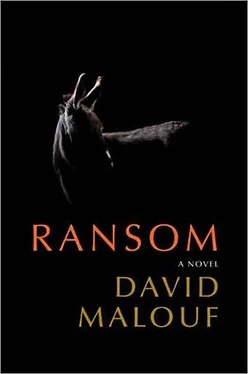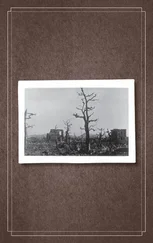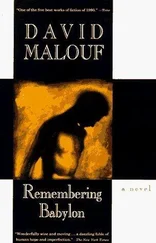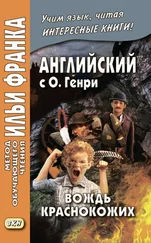Achilles sits and contemplates it: shining brow, lean jaw, the cheeks sunken a little. On the upper lip and chin just the shadow of a beard.
Each morning, when he rides down to confront it, this is what he finds, this figure of what might be a sleeper, composed and still in the naked perfection of its early manhood, laid out as a challenge to him, from the gods, to inflict upon it — the body of the slayer of his friend — the savage depredations that his pride, his grief, his sense of his own high honour demand, and which the spirit of Patroclus, if love is to prove itself, must witness. And each morning, when he discovers yet again how the gods have defied him, he is maddened anew. Outrageous injury swells his veins.
And now?
Leaning forward on the stool, he once again examines his enemy. Frowns. Raises his brow to the clear night sky. Breathes in its freshness.
Something in him has freed itself and fallen away. A need, an obligation. Everything around him is subtly changed. The body at his feet, in the rightness of its imperturbable calm, his own body, which is tensed as it tips forward, also calm. Some cleansing emotion that flooded through him — when? — when Priam first appeared to him in the figure of his father? — has cleared his heart of the smoky poison that clogged and thickened its every motion so that whatever he turned his gaze on was clouded and dark.
He regards Hector’s body now, and the cleanlimbed perfection of it, the splendour of the warrior who has won an honourable death, is no longer an affront.
The affection of the gods for a man whose end it was part of his own accomplished life to accomplish he can now take as an honour intended also to himself. And that, he sees, is how it might have been from the start, and this the first, not the twelfth night.
What he feels in himself as a perfect order of body, heart, occasion, is the enactment, under the stars, in the very breath of the gods, of the true Achilles, the one he has come all this way to find.
He sits quietly in the contemplation of this.
The light of the torch casts a flickering glow a little upwards into the air, creating an effect, in the dark, of a cave whose roof is also the high roof of his skull. At his feet, the body whose quiet he can accept now as a mirror of his own. So long as he sits here, there can be no conflict between them. They are in perfect amity. Their part in the long war is at an end.
So he sits. Then, with a last look down, rises and calls into the dark to where Automedon, just a little way off, has all this time been waiting and keeping watch.
Two grooms carry Hector’s body, slung in a clean sheet, into the low-ceilinged laundry hut. Achilles, stooping, watches as they lay their burden on a scrubbed tabletop, then bob their heads and go out at the low door.
Steam from a cauldron thickens the air, and sharp-smelling woodsmoke. On a bench against the slab wall, an oil crock, a dish with herbs. Beside them, smoothly folded, the linen in which, when it has been sponged and anointed, Hector’s body will be wrapped.
The women who have been woken and called in to do all this, black-shawled and with heavy large-pored faces, huddle in the shadows. Achilles’ presence makes them uncomfortable. The work they do here is women’s work — common enough, they do it daily, but not for the eyes of men. They are waiting for him to leave before they will begin.
But Achilles, who has never before been to this hut, and has never till now even considered its existence, is intrigued. Having followed Hector’s body this far, he is curious to see the next stage of its passage into extinction: the business, humble but necessary, of its last commerce with the world in the hands of women.
And the place itself, now that he has discovered it, compels him in a way he cannot at first account for. There is something here, something about the atmosphere of the place, the damp sweet laundry smell, that he half-recalls and recognises. A room in his father’s palace where he was taken sometimes in the arms of his nurse, whose skin, close up, was large-pored like the skin of these laundry women and whose damp hair he can feel against his cheek. Suddenly he is there again — that smell of dried herbs cut with lye; they have come to fetch a bedsheet for his afternoon nap.
This is the first world we come into, he thinks now, this world of hot-water pitchers and oil jars and freshly laundered linen or wool. And the last place we pass through before our body is done with it all. Unheroic thoughts.
Stooped a little, and still closely wrapped in his cloak, he remains standing, awkward and out of place, just inside the door.
Hector’s body, naked now but with a corner of the sheet drawn lightly over the thighs — a gesture towards modesty on the part of one of the grooms — lies outstretched and waiting, its flesh made rosy by the torchlight, the feet turned out a little. Drawn once again by the deep abstraction of its calm, which his own still feeds on, Achilles is unwilling to break away.
But the women’s presence is stronger than his own. This is their world. So long as he stands here watching they will not begin. He turns, ducks his head under the low door, and steps out again into the yard.
Starlight, shadows, the figures of young men, his Myrmidons on duty. The metal of their swords glinting as they move about between the fires. Bodies sinewy, taut, ready for hard use. Out here, for a time yet, he is one of them; the air, with its cool edge, a reminder of how present and warm he is in his envelope of flesh.
For a time.
Till he too, like Hector, is in there. Naked as he began. Being turned this way then that in the hands of women.
First light. A powdering of frost on the ground. In the portico of Achilles’ hut, where they have made a bed for him of rugs spread with a fine linen sheet, Priam is still sleeping, stiff and straight under two woollen blankets drawn close under his chin. Achilles, watching, is touched by the old man’s dignity, even in sleep, and his thoughts fly once again to Phthia and his father Peleus. The chin is lifted just above the selvedge of the blanket, which is purple, bordered with gold. As the breath blows through them, the lips make a puffing sound, then narrow as a new breath is drawn in.
‘Priam. Priam.’ Achilles bends down towards the sleeping face. ‘It is time.’
The eyes click open and for a heartbeat there is panic in their gaze. The mouth opens, the cheeks are sucked in. Then the old man remembers where he is, how he got here, how it is that the great Achilles, already dressed and armed, is here beside his bed.
‘There is warm water,’ Achilles tells him.
Two servants, one with a pitcher, the other bearing a bowl and cloth, are standing a little way off, in the half-light under the portico awning. The younger of them yawns and looks quickly to see if Achilles has seen it. The other makes a clicking sound of half-indulgent disapproval.
For some reason this exchange between the two, which has caught Priam’s new-found eye for such irrelevant happenings, has an enlivening effect, brings him back into the world with a renewed sense of how full it is of the odd and engaging, and of things to be dealt with and done. He pushes back the covers and, wincing a little as he swings his legs over the side of the cot, gets slowly to his feet, then stands with his eyes closed, waiting for the pain in his hip joint to ease.
Achilles is impressed again by the man’s long bones, and the remains in him of a commanding strength, as, very elegantly but without fuss, he holds his cupped hands over the basin while Alcimus pours, then vigorously splashes water over his head, all the while making little huffing sounds of pleasurable effort. Then accepts the cloth that is offered him, and stands quietly musing, the cloth in his hand, his brow dripping.
Читать дальше












